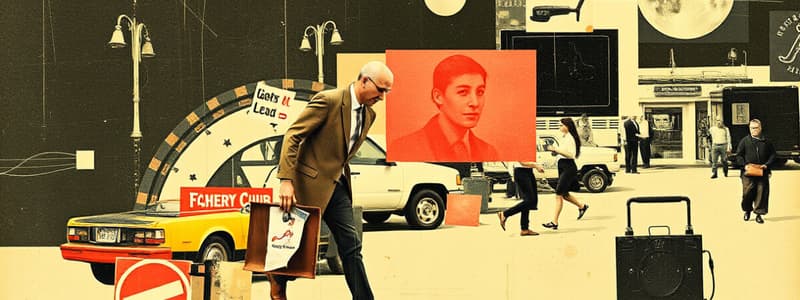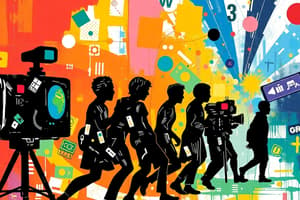Podcast
Questions and Answers
What major technological advancement marked the beginning of the electronic age?
What major technological advancement marked the beginning of the electronic age?
- Telegraph
- Printing Press
- Television
- Transistor (correct)
Which of the following is NOT classified as print media?
Which of the following is NOT classified as print media?
- Television (correct)
- Book
- Magazine
- Newspaper
What publication is characterized by being periodically released, usually on a monthly basis?
What publication is characterized by being periodically released, usually on a monthly basis?
- Book
- Journal
- Newspaper
- Magazine (correct)
Which invention is credited with enabling faster communication and the social networking era in the Information Age?
Which invention is credited with enabling faster communication and the social networking era in the Information Age?
Which year did the telephone get invented?
Which year did the telephone get invented?
What significant development allowed early societies to communicate messages and signals before the written word?
What significant development allowed early societies to communicate messages and signals before the written word?
Which media form is considered the first efficient writing medium that emerged in Egypt?
Which media form is considered the first efficient writing medium that emerged in Egypt?
During which age did the invention of the printing press occur?
During which age did the invention of the printing press occur?
What was one major characteristic of the Pre-Industrial Age in terms of media development?
What was one major characteristic of the Pre-Industrial Age in terms of media development?
What major technological power was harnessed during the Industrial Era?
What major technological power was harnessed during the Industrial Era?
Flashcards are hidden until you start studying
Study Notes
Lesson Objectives
- Discuss the impact of media evolution from traditional to new media on societal values and norms.
- Identify and differentiate various media types: print, broadcast, and new media.
- Compare product/service presentation across different media types.
Evolution of Media
-
Pre-Industrial Age (Before 1700s):
- Emergence of early communication methods, like cave paintings (3500 BC).
- Development of writing media including clay tablets (2400 BC) and papyrus (2500 BC).
-
Industrial Age (1700s-1930s):
- Introduction of steam power, machine tools, and iron production.
- Key inventions:
- Printing press (1440) for mass text production.
- Typing machine (1800) for efficient typing.
- Photography (1830) capturing still images.
- Motion pictures (1890) for visual storytelling.
-
Electronic Age (1930s-1980s):
- Transition to electronic forms of communication.
- Invention of the transistor powering telecommunications.
- Key developments:
- Television (1941) as a major mass medium.
- Projectors (1950) for visual presentations.
-
Information Age (mid 1900s-2000s):
- Rise of the Internet facilitating rapid communication and social networks.
- Key devices:
- Laptops and smartphones enabling portable computing.
- Digital cameras enhancing visual content creation.
Types of Media
-
Print Media:
- Consists of physical publications like books, newspapers, magazines, journals, newsletters.
- Each serves different purposes, such as fiction in books and periodic updates in newspapers.
-
Broadcast Media:
- Includes programs produced by television and radio.
- Utilizes airwaves for transmission, with forms like radio for audio and television for visual content.
-
New Media:
- Features interactive elements that allow two-way communication, primarily through the Internet.
- Incorporates modern technologies like social media and online courses.
Online Learning Platforms
-
Massive Open Online Courses (MOOCs):
- Deliver educational content online without attendance limits.
-
Platforms:
- Coursera: Offers around 2,895 free courses.
- edX: Features over 4,000 courses focused on career building.
- Udemy: Provides a vast selection of 210,000 courses with continuous updates.
Wearable Technology
- Devices worn on the body enhancing functionality:
- Smart Watches: Sync with phones for fitness tracking and vital checks.
- VR Headsets: Deliver immersive virtual reality experiences.
- Smart Glasses: Combine connectivity and imaging capabilities.
- Hearing Aids: Improve sound clarity for individuals with hearing loss.
Studying That Suits You
Use AI to generate personalized quizzes and flashcards to suit your learning preferences.




